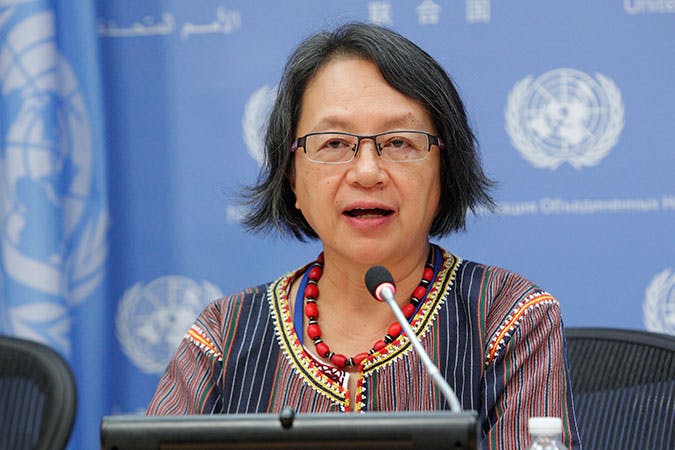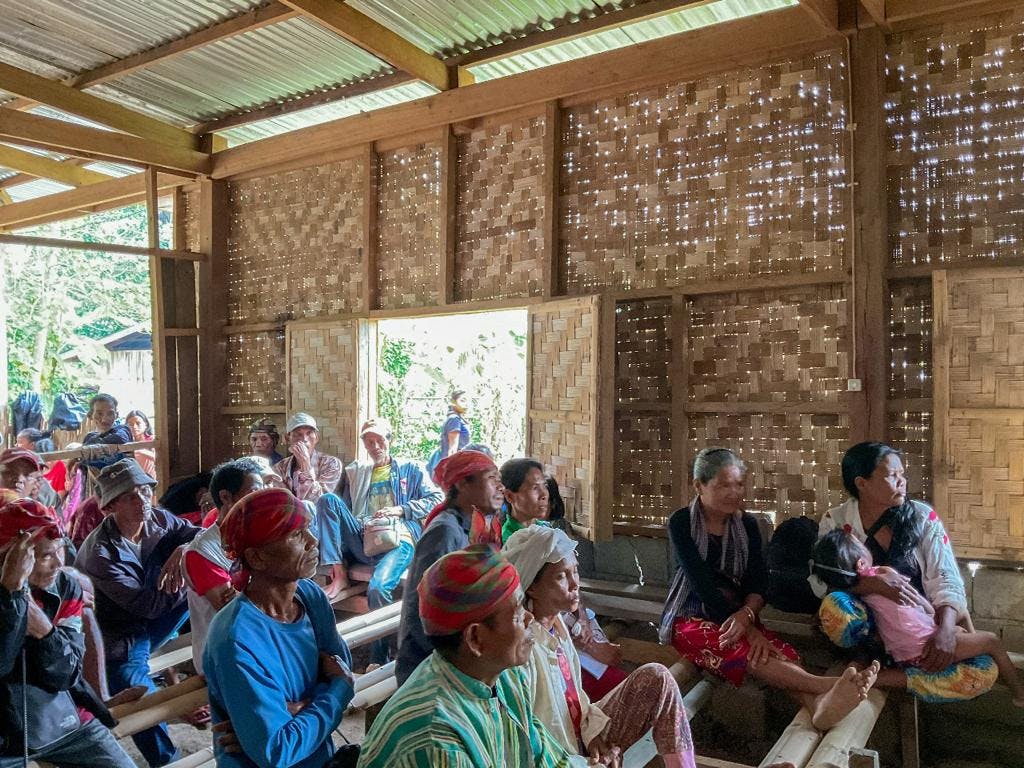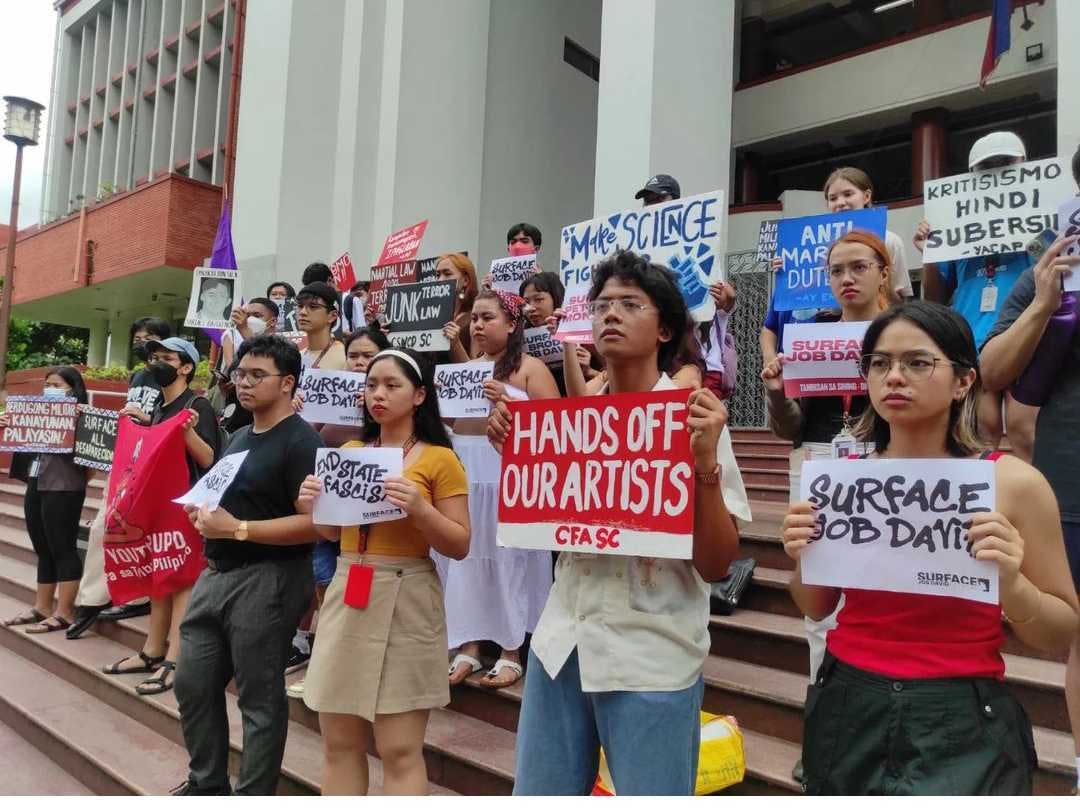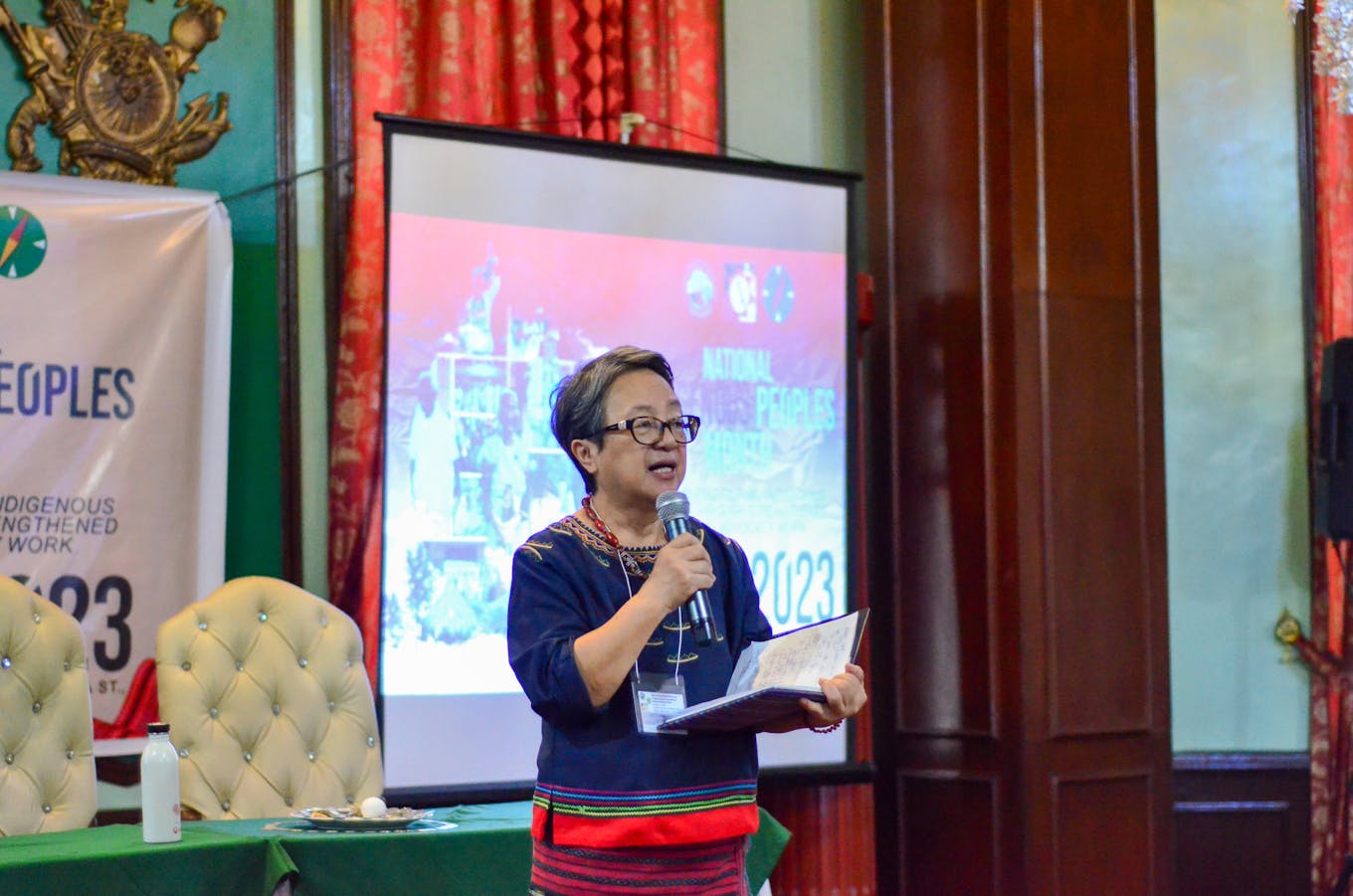The Philippines has gained notoriety for being Asia’s deadliest country for land and environmental defenders, with nearly 300 deaths over the past decade, roughly one-third of which were linked to mining, according to watchdog group Global Witness.
Many of the activists are Indigenous Peoples (IP) rallying to protect their homeland.
Yet over the years, they have faced threats to their way of life and the environment they depend on from extraction, overconsumption and overproduction.
In 2017, a massive military operation was launched by former Philippine president Rodrigo Duterte to drive away the Lumads, the collective name for the Indigenous peoples of Mindanao.
Victoria “Vicky” Tauli Corpuz, then the United Nations special rapporteur on the Rights on Indigenous Peoples, publicly condemned the displacement of the Lumad communities. As a result, her name surfaced on a list of 600 people that the government classified as terrorists because, it said, they were members of two banned leftist groups: the Communist Party of the Philippines and the New People’s Army.

Vicky Tauli Corpuz speaks before the United Nations Permanent Forum on Indigenous Issues in 2017. Image: UN
A Kankanaey Igorot woman who grew up in the hills of the Cordillera region in the northern Philippines, Tauli-Corpuz has become one of the most prominent figures in the global movement for the recognition of Indigenous rights.
The 70 year-old advocate is currently founder and executive director of the Philippines-based Indigenous Peoples’ International Centre for Policy Research and Education or Tebtebba, an Igorot term which refers to a process of collectively discussing issues to reach agreements.
She worked for years as a community organiser in her home island of Luzon, and helped lead the successful push for the UN General Assembly to adopt the Declaration on the Rights of Indigenous Peoples (UNDRIP) in 2007. The declaration is considered a major, universal human rights document that Indigenous people frequently resort to when defending their rights.
Last month, she was shortlisted for the Nobel Peace Prize, one of the two Indigenous leaders in the running for the prestigious award.
This is the first time that the Norwegian Nobel Committee included a category for Indigenous environmental defenders.
Although, she did not bag the top prize for the Philippines, like journalist Maria Ressa last year, Tauli-Corpuz remains steadfast in her advocacy to empower Indigenous groups.
In this podcast, Eco-Business talks to the environmental and human rights activist about her lifelong journey in empowering vulnerable communities.
Tune in as we talk about:
- The aftermath of being labelled a terrorist
- The “embarrassment” of the Philippines being the most dangerous country for environmental defenders
- Why the government’s anti-insurgency programme must be abolished
- Thoughts on how only 7 per cent of US$1.7 billion pledged at COP 2021 has been channelled directly to Indigenous peoples
- Corruption and the sale of ancestral land
- The COP28 agenda
How does it feel to be considered for the Nobel Peace prize?
It’s an honour to be a nominee. I never thought in my wildest dreams that it would ever happen. I learnt about it from the media. It’s a good thing that kind of recognition came about because it makes the issues of Indigenous Peoples more visible. [IP issues show] the link between protecting and respecting our human rights and enhancing our capacity to be able to contribute to that global environmental crisis of climate change and biodiversity erosion.
Tell us about your work for Tebtebba.
I’m the founder and the executive director of Tebtebba, which began in 1996. It emerged because myself and some of my colleagues felt that not enough attention was being given to Indigenous people’s rights, which are basically collective rights. When you talk about human rights, it’s usually in reference to the individual, but for Indigenous peoples, it’s both individual and collective. They are rights that mean their very survival of distinct peoples and cultures.
If we are able to get the United Nations to develop an instrument to protect our rights and get this to be approved and supported by nation states, then maybe there is a bigger chance for us to be able to not just to survive but to contribute in bringing about better changes for the dominant society as a whole.

In September 2023, members of the Lambangian tribe gathered for training on Indigenous Peoples’ rights at Sitio Benuan in Maguindanao del Sur, Mindanao. Image: Tebtebba
What happened after you were tagged as a terrorist by the Duterte administration in 2018?
I was already the UN special rapporteur on the rights of Indigenous peoples at that time. This means that no state can file a case against me or identify me in those terms, because I’m supposed to be an independent expert, monitoring and reporting on the situation of Indigenous people. When I got included in the [terrorist] list, I immediately reached out to the United Nations Human Rights Council, as well as the secretary general. I was glad that they responded and made a big issue out of it.
There were meetings held with the Philippine government in Geneva to ask questions about why I was included in that list. A global campaign ensued, which led to the withdrawal of the list.
It was kind of scary for me because you could never tell what the implications will be of being included on a list like that when at that time, there was a crusade against drug users and drug dealers. It could be made a justification for him [Duterte] to let loose his armed men to go after anybody on that list.
I was in New York at that time because I was attending the United Nations Permanent Forum, that I used to chair. I stayed there for a few more weeks then I went back home.
Why didn’t you go into hiding?
With the kind of attention that the global community gave the issue, I thought that it would be a mistake on the government’s part to arrest or do anything against me. I don’t really want to live outside of the country anyhow.
But these kinds of accusations and labeling never stop. I have a brother on the list of the anti-terrorism council. That’s the kind of story that is unfolding in the Philippines, unfortunately.
It seems like you are so used to it.
I was an activist during the Marcos dictatorship [The father of current Philippine president Ferdinand Marcos, Jr ruled the country for nearly two decades until 1986, an era noted for widespread poverty, unemployment and a debt crisis.]. When martial law was declared, my name was already called in the order of battle. When my father learnt about it, the commander of the Philippine army used to be a classmate of my father. He brought me to the general and he cleared my name.
I had a brother who was detained in Mindanao, and another one detained here in Baguio. It’s something that comes along with the commitment we have, as a family of human rights activists and environmental defenders.
If we just live in fear, that will just stop everything we are doing. It not something we need at this time when Indigenous Peoples are subjected to these kinds of attacks.
Did you ever give in to fear?
Not really [laughs].
What are your thoughts on the Philippines being the most dangerous country for environmentalists in the Global Witness report for the past 10 years?
It’s unfortunate to have that kind of situation in the Philippines. Being a UN special rapporteur, I have been to many countries, as part of my mandate. If you compare the Philippines to these other countries, I’m ashamed to see that our country is really one of the worst in terms of those kinds of acts against human rights and environmental defenders. The kinds of violence done against people who are just simply doing what they believe they should be doing is totally unacceptable.
It’s such an embarrassment that it’s happening in our own country. We have very good laws to begin with, we have very good Indigenous people rights act, and yet that is the kind of picture we see.
“
If you compare the Philippines to these other countries, I’m ashamed to see that our country is really one of the worst in terms of those kinds of acts against human rights and environmental defenders.
What makes you say the Philippines is the worst in terms of Indigenous Peoples and environmental rights defenders?
I’ve been to Mexico and Columbia. There is a degree of drug cartel control in those countries, and there are also a lot of journalists and Indigenous peoples who have been arrested and killed there, but it’s not as bad as I see here in the Philippines. It’s really bad.
[Mexico and Colombia] are also high in number of disappearances and killings in the Global Witness report, but it’s the criminals in the drug cartels who are involved. But in the Philippines, it’s the state [who is involved]. It’s so ironic because they are the ones who are supposed to protect your human rights. They are the duty bearers for human rights.
We’ve already ratified a lot of the most important human rights conventions and yet here we are with this situation. It only means there’s a lot of work to be done in terms of changing the mindsets of the security forces, whether military or police, as well as the implementation if the NTF-ELCAC (National Task Force to End Local Communist Armed Conflict).
This is something I’ve never seen in all the countries I have been to – having a very systemic and comprehensive programme is very unique to the Philippines.

University of the Philippines students protest the disappearance of Indigenous peoples youth leaders Job David, Alia Encela and Jimby Del Monte Jr, who were allegedly abducted and have been missing since 19 September. The three were reportedly kidnapped at the height of military investigations of bombings in communities in Oriental Mindoro. Image: Tambisansasining Instagram page
Tell us more about the NTF-ELCAC and why it is worrisome for Indigenous peoples and environmental defenders.
It’s a national task force to end local communist armed conflict. It’s a counter-insurgency programme that’s meant to quell or totally wipe out communist insurgency. In the process of implementing this, they just tag everybody critical of the state, anybody who is doing their work in terms of empowering their own communities, or defending communities against mining operations, these are the people who are tagged as so-called terrorists or communists.
How can you have this tagging that in the end leads to either you being killed extrajudicially, disappeared or imprisoned, with all the false charges filed against them?
This is a programme very much against all the human rights conventions that the country has ratified. It should be withdrawn, it should not be there.
I’ve been in dialogues with the army and the police and I tell them the reason why there is this kind of insurgency is because of the basic issues they are facing in terms of poverty, corruption, among others. The way to solve this problem is addressing these root causes of dissent. The way [companies] impose a project and not even get the consent or consult the people who are directly affected are kinds of things that cannot continue to happen that way.
And if it does, no matter what you do, the kind of protest and resistance that people are putting up will lead you to be labeled as a country, as a state, that does not respect human rights.
[The government’s NTF-ELCAC is] a programme very much against all the human rights conventions that the country has ratified. It should be withdrawn, it should not be there.
In your work in Tebtebba, what are your projects that specifically go against this kind of operation?
The work that we do is really to enhance the capacities of Indigenous peoples to empower themselves. We believe that if you are empowered, you know your rights, you are more united, more determined to defend your own territories and resources, then that will give you a bigger chance of being able to stand up against such trends of violations.
We do a lot of training now for Indigenous Peoples for them to understand their rights. We help them map and do an inventory of the biological diversity in their areas so they will know the wealth found in their communities.
We also encouraged them to work closely with the local government units so that they will be able to advocate for their rights and show them that what they are doing is actually supporting, the government.
I always say in my meetings with government, that we are helping build the nation by providing the cultural and biological diversity. We have an overlay of maps on protected areas, which will overlap with the ancestral domains of Indigenous people. This is evidence that we are doing a lot to contribute to making the country more environmentally sustainable.
We are not against development. We are for development that will sustain the ecosystems where we are living and will not destroy the very source of life that we depend on.
Last year, a report by the Forest Tenure Funders Group found that of the US$1.7 billion pledged for supporting IPs and communities at the COP 2021 conference, only 7 per cent went directly to them. About 19 per cent of the pledged total has already been given, but most of the money has not been channeled directly to local communities because Indigenous peoples-led groups are unable to absorb large grants. What are your thoughts on this?
I think it is a view that is a misrepresentation of what Indigenous Peoples are capable of. I don’t believe that IP groups are not capable [of absorbing large grants]. One of the things we do is train communities to make their own financial accountability more systematic. We do a lot of trainings and they are able to account for every single cent they receive.
I think it’s a myth being spread by around to justify some of the intermediary groups who would like to get the money in behalf of the Indigenous people. I know there are some big conservation and environmental organisations who are presenting themselves as the ones working with Indigenous Peoples. Therefore some of the money should be provided to them and they will be the ones to distribute to the communities. The reality is not like that. That is something that has to be rectified.
“
We are not against development. We are for development that will sustain the ecosystems where we are living and will not destroy the very source of life that we depend on.
In the Philippines, mining companies who obtain consent from IP groups to extract from their land give royalties to them, but there are times when the amount is not enough, or if it is, the tribal leaders do not distribute it fairly among the members. What are your thoughts on this corruption among IP groups and inequitable distribution of funds by mining firms?
We have a National Federation of Indigenous organisations and communities. We always tell them that we have to really account for any money that we receive, because, we are very much critical of the corruption that’s happening the government, even within the National Commission on Indigenous Peoples (NCIP).
There are Indigenous organisations who are not being accountable. In Mindanao, there are Indigenous leaders called “Indigenous dealers” because they are easily corrupted by mining companies to give the consent [to build infrastructure on protected ancestral land]. They create groups that are not the real authorities in the community who will give the consent. Then the mining companies will claim that the consent has been provided. But that’s because they also were able to pay or bribe some so-called leaders.
What are your thoughts on IP groups selling their ancestral land?
In the Indigenous People’s Rights Act, you are not supposed to sell your ancestral land because it is collectively owned by the tribe. I come from [the municipality of] Besao. We have a very strong customary law that you are not allowed to sell land, no matter how small, to outsiders. That is a law that exists until today and everybody follows it. But this is maybe because we are the majority in our communities. It is not the situation in other places like in Mindanao where there are bigger number of outside settlers in their communities. They find themselves in more difficult situations.
Don’t you think it is something they cannot help because the government does not have livelihood programmes for some of them?
That’s precisely why we also promote economic empowerment. Even if you have your own land, if you cannot do livelihood projects or make it more productive, that’s when people have to sell their lands.
We are calling for the state and other entities to support the efforts of Indigenous Peoples to economically empower themselves. They must have the means of production, whether these are rice meals; kinds of technology that will help them in their access; the knowledge to develop their own organic fertilisers and pesticides so they do not have to depend on environmentally destructive chemicals, among others. That should be part of the package of support the community should receive if they ask for it.
There are several communities which have certificates of ancestral domain titles but no one is supporting them to implement their own sustainable development plan. Out of desperation, if someone gets sick or there’s an emergency, they have no recourse but to sell their land. You cannot blame them for that.

Vicky Tauli Corpuz addressing an audience during the celebration of Indigenous Peoples month in the Philippines. Image: Tebtebba
You will be participating in the upcoming COP28. What will be your main agenda?
One is to ensure that human rights is at the center of climate change solutions. Whether this is under renewable energy or the voluntary carbon market, Indigenous people’s rights must be protected, their lands not being taken away, their consent is being obtained, and they are not being criminalised.
Second is the issue of direct access to climate funds. There should be a mechanism in place where Indigenous peoples can have direct access to funds and hey don’t have to go through intermediaries.
Thirdly, we are pushing for the ones responsible for the climate crisis should really bear the bigger responsibility in terms of cutting back emissions that they are doing, but also providing the resources that are needed by poor countries so that they will be able to adapt to the impacts of climate change.
Speaking of the loss and damage fund, there wasn’t any outcome from the transitional committee meeting in Egypt this month. Countries failed to agree on key aspects of the fund. Do you see this changing at the COP28?
This whole concept of the transitional committee of loss and damage was thought impossible in the past because many of the rich countries, who were the sources of this kind of loss and damage, are still against any effort to bear the heavier burden.
But in the end the committee was created, the agreement to set up the fund was passed.
The hope for the next COP is that they will really put their money where their mouth is. I still think that something will happen because the majority of parties, the Group of 77 (G77) and China are going to push hard for this. The system at the COP is that it should be an agreement reached by consensus. We are in such desperate straits that if we don’t get those main carbon emitters to carry their responsibility, it’s going to mean disasters not just for us but for them.
Economic and political interests are always at play. Those are the kinds of challenges we continue to face, but we never give up hope. We will just want to keep on fighting because that’s the right thing to do.
Want more Philippines ESG and sustainability news and views? Subscribe to our Eco-Business Philippines newsletter here.




















